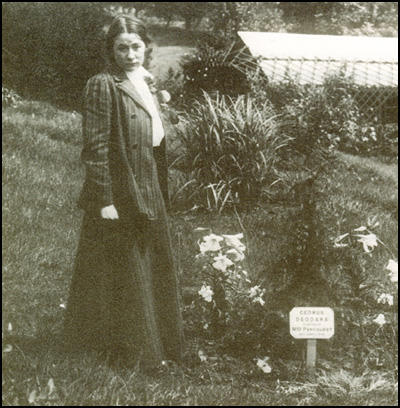On this day on 23rd May
On this day in 1795 Charles Barry was born in London. He was apprenticed to a firm of surveyors before training as a architect in Italy (1817-20). Influenced by the architects of the Italian Renaissance, when Barry returned to England he designed the Travellers Club (1832) that had been founded by Lord Castlereagh in 1814.
In 1834 most of the Old Palace of Westminster was destroyed by fire. Charles Barry and Augustus Welby Pugin were commissioned to design and build a new House of Commons and a House of Lords.
Other buildings designed by Barry include the Athenaeum in Manchester (1836), Trafalgar Square Precinct (1840) and the Cabinet Office (1845). He also designed the new Reform Club, an exclusive gentleman's club formed by leading Whigs to celebrate the passing of the 1832 Reform Act.
Sir Charles Barry died on 12th May 1860.
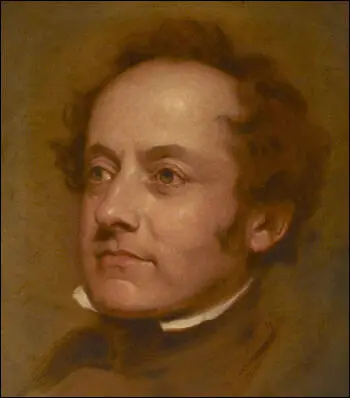
Margaret Fuller was born in Cambridgeport, Massachusetts, 23rd May, 1810. Her father was Timothy Fuller, a Republican Party member of Congress. Margaret was educated by her father, before attending the local school when she reached the age of fourteen.
After the death of her father from cholera in October, 1835 she supported her mother and her brothers and sisters by teaching in Boston (1836-37) and Providence (1837-39).
In 1840 Fuller and Ralph Waldo Emerson established the progressive journal, The Dial. For the next two years she edited the journal and in one article, The Great Lawsuit, she called for sexual equality.
In 1844 she published a study of frontier life in Illinois and Wisconsin, Summer on the Lakes. Later that year Fuller was recruited by Horace Greeley to write for the New York Tribune. In the newspaper Fuller wrote about modern literature and advocated social reforms. Greeley later described Fuller as "the most remarkable and in some respects the greatest woman whom America has yet known".
Fuller also wrote feminist tract, Women in the Nineteenth Century (1845). She argued: "We would have every arbitrary barrier thrown down. We would have every path laid open to Woman as freely as to Man. Were this done, and a slight temporary fermentation allowed to subside, we should see crystallizations more pure and of more various beauty. We believe the divine energy would pervade nature to a degree unknown in the history of former ages, and that no discordant collision, but a ravishing harmony of the spheres, would ensue."
The book's theme was that women must fulfill themselves as individuals and not as subordinates to men. She wrote that "when inward and outward freedom for woman as much as for man shall be acknowledged as a right, not yielded as a concession." Fuller's writings on political equality influenced a generation of feminists involved in the struggle for women's suffrage. This included Susan B. Anthony, Elizabeth Cady Stanton, Olympia Brown, Lucretia Mott and Lucy Stone.
In 1846 Fuller became the first American woman to become a foreign correspondent and reported for the New York Tribune from Britain, France and Italy. While in Europe she married the Italian freedom fighter, Angelo Ossoli. Fuller now began advocating socialist views and during the Revolution of 1848 assumed charge of a hospital in Rome while her husband took part in the fighting. The city fell in 1850 and the couple were forced to flee.
In May, 1850, Margaret Fuller, Ossoli, and their young son sailed for America. All three died when their ship was wrecked in a storm off New York on 19th July, 1850.
On this day in 1855 Florence Douglas, the daughter of Archibald William Douglas, 7th Marquess of Queensbury, and her twin brother, James, were born on 25th May 1855. Three years later the their father died in a shooting accident. It was widely believed that the Marquess had committed suicide. In 1862 Florence's mother converted to Roman Catholicism and fled to Paris with her children.
Florence was educated at home and in a convent. In 1875 she married Sir Alexander Beaumont Churchill, 11th Baronet Dixie. The couple lived at Bosworth Hall in Leicestershire. After having two sons, John and Albert, Florence, her husband, and her twin brother, travelled to Patagonia. When she was asked why she replied that she wanted "to flee from the strict confines of polite Victorian society". In 1880 she published her best-selling travel book, Riding Across Patagonia.
In 1879 she gained a commission as war correspondent for The Morning Post and covered the Zulu Wars in South Africa. It is believed that she was the first British journalist to report from a war zone. On her return to England she published Land of Misfortune (1882).
Lady Florence Dixie also supported Home Rule for Ireland. However, she was highly critical of the Irish Land League and survived an assassination attempt by Fenians. Queen Victoria sent John Brown to investigate the case. Unfortunately he caught a chill and died while on the case.
Lady Dixie also wrote novels with a political message. She proposed equality of the sexes in marriage and divorce, identical male and female clothing and reform of the royal succession to allow the oldest child of either sex to inherit the throne. A member of the National Union of Women's Suffrage Societies she published The Revolution of 1900 in 1890. Described as a feminist fantasy, the book features an heroine whose activities lead to women winning the vote. The last chapter is set in 1999 where a peaceful and prosperous Britain is living under female rule.
Lady Dixie remained close to her twin brother James and she was devastated when he committed suicide by cutting his throat on 4th May 1891. Lord Dixie also had serious financial problems and was forced to sell his family home, Bosworth Hall.
In 1895 Nettie Honeyball established the British Ladies Football Club. Lady Dixie agreed to become president on condition that "the girls should enter into the spirit of the game with heart and soul." She also arranged for the football team to tour Scotland.
Lady Dixie arranged for the British Ladies teams to play some games in Scotland. The local newspaper poked fun at the women. One journalist commented: "One of the full-backs was suspected of playing in her brother's knickers. The fair player was frequently asked for the name of her tailor."
Other books by Lady Dixie included the novel Redeemed in Blood (1889). She argued against the hunting of wild animals in The Horrors of Sport (1891). In The Evolution of a Mind (1903), she expressed her growing atheism and her views on the liberation of women. She also provided a feminist introduction to Joseph McCabe's Religion of Woman (1905).
Lady Florence Dixie died on 7th November 1905.
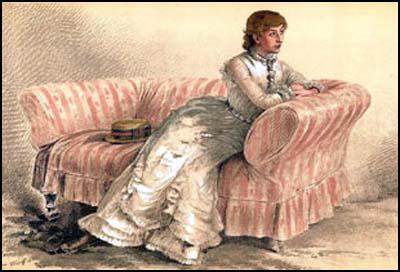
On this day in 1855 Isabella Ford, the daughter of Robert Ford and Hannah Pease, was born in Leeds. Ford came from a prosperous family from the West Riding of Yorkshire. Although a substantial landowner, Ford worked as a solicitor in Leeds. Hannah Pease also came from a wealthy family. Her grandfather, Thomas Pease, had been one of the major shareholders of the Stockton to Darlington Railway.
Robert and Hannah Ford were both Quakers and this influenced they way they raised their eight children. For example, although members of the upper middle-class, the Ford children were taught to treat the servants with "esteem, equality and friendship". Robert and Hannah Ford also believed in gender equality. Like her brothers, Isabella was taught science and history, as well as art and literature. The children were encouraged to develop inquiring minds and at home were expected to take part in discussions about current political issues.
Robert and Hannah Ford's politics were different from most other members of their class. They supported John Bright, the Quaker MP for Manchester, and his campaigns for parliamentary reform and the repeal of the Corn Laws. The Fords also supported other progressive causes such as prison reform and the protection of wild life.
The family home at Adel Grange near Leeds became a place where radicals could meet and discuss politics. As a young woman, Isabella Ford met prominent feminists such as Josephine Butler and Elizabeth Garrett Anderson. In 1875 Isabella met Edward Carpenter, a former Anglican priest who had began to question conventional ideas on politics and sexuality. Carpenter introduced Ford to socialist ideas and in 1883 they both joined the recently formed Fabian Society, an organisation which aimed to "reconstruct society in accordance with the highest moral possibilities through political means".
In 1885 Isabella helped Emma Patterson, President of the Women's Protective and Provident League, to form a Machinists' Society for tailoresses in Leeds. This was the start of a long campaign by Ford to improve the pay and conditions of women working in the textile industry in Leeds. In 1889 she established the Leeds Tailoresses' Union and the following year she was elected president of the organisation.
Isabella retained her interest in women's rights and in 1890 helped form the Leeds Women's Suffrage Society with her sister Bessie and their sister-in-law, Helen Cordelia. Three years later, Isabella was involved in forming a Leeds branch of the Independent Labour Party (ILP). The two organizations worked closely together and women such as Mary Gawthorpe and Ethel Annakin were active members of both groups. By the early 1900s Isabella Ford had developed a national reputation for her talents as a speaker and organizer. Ford was also an important writer of books on the struggle for equality. This included Women's Wages (1893), Industrial Women (1900) and Women and Socialism (1904).
In 1903 Isabella became a member of the national executive committee of the ILP. She played an important role in persuading leaders of the ILP such as Philip Snowden to support women's suffrage. Isabella argued that the emancipation of women and the emancipation of labour were strongly linked and that "socialists should support the struggle of women, just as women should support socialism."
Some suffragists disapproved of Isabella Ford's socialism but it 1907 it did not prevent her being elected to the executive committee of the NUWSS. In 1912 she upset members of the Liberal Party when she persuaded the NUWSS to support Labour Party candidates in parliamentary elections.
Isabella Ford, a life-long pacifist, was deeply concerned by the growing hostility between Britain and Germany. In the summer of 1914, Ford and Helena Swanwick helped organise a peace rally in London. Supported by the NUWSS, the Women's Labour League and the International Women's Suffrage Alliance, the rally was held on 4th August. During the meeting at the Kingway Hall they heard the news that Britain had declared war on Germany.
The women's movement was split over the issue of what role women should play during the First World War. The leadership of the WSPU was willing to do whatever was necessary to defeat Germany. Millicent Fawcett of the NUWSS urged her members to concentrate on relief work. Others like Isabella Ford and Helena Swanwick argued that the women's movement should use its energies to try and secure a ceasefire.
As the war went on Isabella found herself more and more isolated and in 1915 was forced to resign from the executive committee of the NUWSS. For the rest of her life, Ford concentrated her efforts helping the peace movement. In the years, 1919, 1920, 1921 and 1922 Ford was a delegate to the Women's International League Congress.
Isabella Ford died on 14th July 1924.
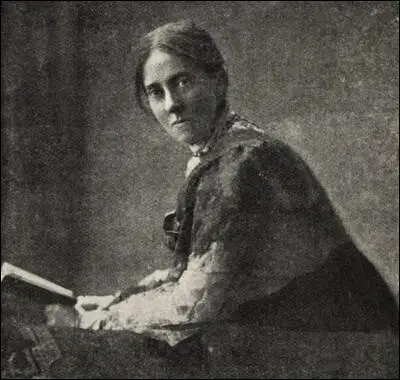
On this day in 1913 Women Social & Political Union member Miriam Pratt appears in court accused of setting fire to an empty building attached to the Balfour Biological Laboratory for Women, in Storey's Way, Cambridge, with paraffin-soaked cloth. The building was erected in 1884 on for the use of women studying science at Newnham and Girton. The laboratory enabled women to learn about anatomy, dissection, microbiology, zoology, chemical compounds and physics.
Fern Riddell has pointed out why Miriam selected this target: "But what good was a university laboratory, and a university education, if women were refused the right to be awarded their degrees? Although universities permitted women to attend courses and take exams, they were not allowed to graduate, and there was little opportunity for them to use the knowledge they acquired in the world outside the protected college atmosphere. Perhaps it was the unbearable unfairness of this inequality that removed any qualms Miriam and her companions might have felt that night, as they broke and set a fire that consumed a considerable amount of the adjoining building before the alarm was raised."
When the police examined the scene of the fire they found suffrage literature. This was done to show the authorities that the crime had been committed by the WSPU in protest against the government's decision not to give the vote to women. Frank Meeres has pointed out that two buildings in Cambridge had been targeted, "first a new house being built for a Mrs Spencer of Castle Street, then a new genetics laboratory. Suffrage leaflets were found in both. A lady's gold watch was discovered outside the window of the laboratory which had been used to get in.... Blood had been found where the arsonist had cut herself while scraping out the putty around the window; Miriam had a corresponding wound."
Miriam's uncle, William Ward, was involved in the investigation. He suspected the watch belonged to Miriam. When confronted by Ward about the matter she admitted that she had carried out the attack. As a result she was arrested and taken to the local police court. The Cambridge Independent Press reported that Miriam Pratt was a "tall, pretty girl", who was "dressed in a light blue corduroy coat, a blue cloth skirt, and black velvet toque trimmed with light blue ribbon."
Miriam Pratt was remanded for eight days before being granted bail. The sureties of £200 was raised by a friend, Dorothy Jewson, a member of the WSPU and the Independent Labour Party. Miriam was suspended from her job at St Paul's National School in Norwich. On 18th July, Miriam attended a protest demonstration held on Norwich Market Place against the Cat and Mouse Act.
Miriam Pratt appeared at Cambridge Assizes in October. She chose to represent herself. The main evidence against her came from her uncle. Miriam asked the judge: "Is it legal for the witness to give evidence of a statement he alleges to have obtained from me not having first cautioned me, he being a police officer?" The judge replied: "That does not disqualify him. He was not acting as a police officer." Miriam asked her uncle: "Don't you think it was your duty as a police officer to caution me?" He admitted "it was my duty, but I was speaking to you as a father would do, and I omitted to caution you."
In her final statement to the court, Miriam admitted her guilt: "I ask you to look again at what has been done and see in it not wilful and malicious damage, but a protest against a callous Government, indifferent to reasoned argument and the best interests of the country. A protest carried to extreme because no other means would avail... show by your verdict today that to fight in the cause of human freedom and human betterment is to do no wrong."
Miriam was sentenced to eighteen months' hard labour and sent to Holloway Prison. Soon after her arrival surveillance photographs of Miriam were taken from a van parked in the prison exercise yard. The images were compiled into photographic lists of key suspects, used to try and identify and arrest Suffragettes before they could commit militant acts.
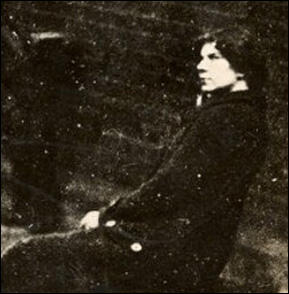
On this day in 1922 Margaret Haig explains in Time and Tide why all women need the vote.
On December 23rd, 1919, the Sex Disqualification (Removal) Act passed into law, and for the past two years or more it has been gradually dawning upon women of all classes, ages and professions, that the Sex Disqualification (Removal) Act does not remove sex disqualification.
Let us examine this Act a little more closely. When it was passed it was presented by the Government as a Charter of Freedom. Henceforth women were to enjoy equal opportunities, equal chances, equal rights with men. It was a reversal of the customs of the ages. It was, as Mr. Talbot pointed out last Friday, a revolutionary piece of legislation. Incidentally it was the carrying out of a pledge made by the Coalition to the women just before the previous General Election and signed by Mr. Lloyd George and Mr. Bonar Law: 'It will be the duty of the new government to remove all existing inequalities in the law as between men and women.'
Specifically, of course, the Act did not do a very great deal. It was quite short, consisting of four clauses only. The first clause dealt with the admission of women to the Civil Service, to which, for practical purposes, if not in theory, they had been admitted before; and to juries, which was a new departure. It also entitled women to become magistrates and to be admitted and enrolled as barristers or solicitors. The first sub-clause to clause I contracted out of the obligations of the Act to admit women on equal terms into the Civil Service by providing that all regulations dealing with this admission should be left to Orders in Council.
The second sub-clause to clause I gave power to a judge to order that a jury should be composed of men only or women only as the case might be, and that on application being made a woman might be exempted from serving in a case 'by nature of the evidence to be given or of the issues to be tried.'
The second clause dealt with the qualifications necessary to entitle women to be admitted and enrolled as solicitors on the same terms as men.
The third clause stated that nothing in the statutes or charter of any university should be deemed to preclude the authorities of such university from admitting women to its membership. It was as a result of this that in 1920 Oxford admitted women to full membership. The clause was, however, merely permissive, and Cambridge has elected not to act upon it. Women were already admitted to membership of every other university in the United Kingdom before this date.
The fourth clause was simply the short title and repeal clause usual in Acts of Parliament.
To sum up, what the Bill actually did was:- To admit women to jury service although not on the same terms as men. To allow women to become magistrates. To allow women to become barristers or solicitors. To grant power to Oxford and Cambridge to admit women to membership if they chose.
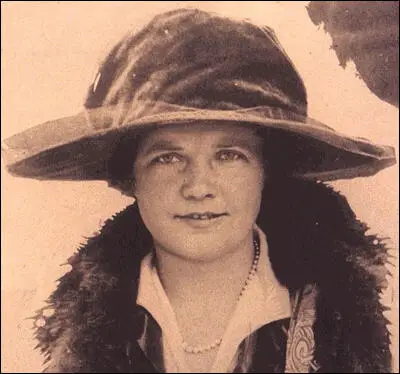
On this day in 1923 Joseph Stalin explains why he is not willing to accept freedom of expression in the Soviet Union. At the Communist Party Congress a member asked more freedom of discussion in the party. Stalin replied that the party was no debating society. Russia was "surrounded by the wolves of imperialism; and to discuss all important matters in 20,000 party cells would mean to lay all one's cards before the enemy."
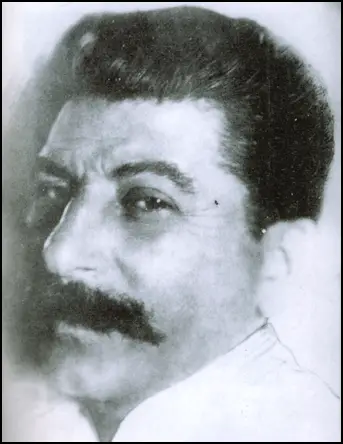
On this day in 1937 American businessman John D. Rockefeller, died. Rockefeller was born in Richford, New York on 8th July 1839. He attended the Cleveland Central High School and at 16 he became a clerk in a commission house. Determined to work for himself, Rockefeller saved all the money he could and in 1850 went into business with a young Englishman, Maurice Clark. The company, Clark & Rockefeller Produce and Commission, sold farm implements, fertilizers and household goods.
Rockefeller's company was fairly successful but did not bring him the wealth he desired. In 1862 Rockefeller heard that Samuel Andrews had developed a better and cheaper way of refining crude petroleum. Rockefeller sold his original business and invested it in a new company he set up with Andrews called Standard Oil.
One of the business problems that Rockefeller encountered was the high cost of transporting his oil to his Cleveland refineries (40 cents a barrel) and the refined oil to New York ($2 a barrel). Rockefeller negotiated an exclusive deal with the railway company where he guaranteed sixty car-loads a day. In return the transport prices were reduced to 35 cents and $1.30. The cost of his oil was reduced and his sales increased dramatically.
Within a year four of his thirty competitors were out of business. Eventually Standard Oil monopolized oil refining in Cleveland. Rockefeller now bought out Samuel Andrews for a million dollars and turned his attentions to controlling the oil industry throughout the United States. His competitors were given the choice of being swallowed up by Standard Oil or being crushed. By 1890 Rockefeller's had swollen into an immense monopoly which could fix its own prices and terms of business because it had no competitors. In 1896 Rockefeller was worth about $200 million.
In November 1902, Ira Tarbell, one of the leading muckraking journalists in the United States, began a series of articles in McClure's Magazine on how Rockefeller had achieved a monopoly in refining, transporting and marketing oil. This material was eventually published as a book, History of the Standard Oil Company(1904). Rockefeller responded to these attacks by describing Tarbell as "Miss Tarbarrel".
President Theodore Roosevelt, who had been elected on a program that included reducing the power of large corporations, attempted to use the Sherman Anti-Trust Act to deal with Rockefeller's monopoly of the oil industry. This was largely ineffective and it was not until 1911 that the Supreme Court dissolved the Standard Oil monopoly.
The various press campaigns against Rockefeller had turned him into one of America's most hated men. A devout Baptist, Rockefeller began giving his money away. He set up the Rockefeller Foundation to "promote the well-being of mankind". Over the next few years Rockefeller gave over $500 million in aid of medical research, universities and Baptist churches. He was also a major supplier of funds to organizations such as the Anti-Saloon League that was involved in the campaign for prohibition. By the time that he died John D. Rockefeller had become a popular national figure.
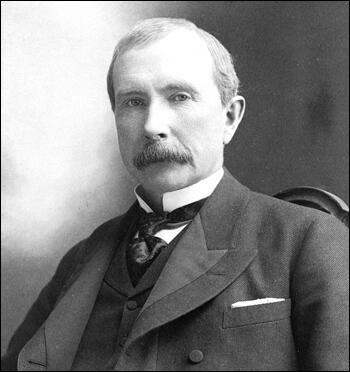
On this day in 1961 Adela Pankhurst died. Adela, the youngest daughter of Dr. Richard Pankhurst and Emmeline Pankhurst, was born in Manchester in June 1885. She had two older sisters, Christabel Pankhurst and Sylvia Pankhurst. According to Fran Abrams: "There was no great novelty to the addition of a third girl to the existing brood, and in any case this child was a sickly creature. She had weak legs and bad lungs, and for a time was not expected to live." Adela was forced to wear splints on her legs and did not learn to walk until she was three.
Adela later recalled how her father played an important role in her education: "I think I was only about six when my father - a most revered person in my existence - assured me there was no God." She was happy at her first school in Southport but did not like her experience at Manchester Girls' High School. On one occasion she tried to run away from school and home.
Richard Pankhurst, a radical lawyer, was one of the Independent Labour Party candidates in Manchester, who had been defeated in the 1895 General Election. Christabel's father died of a perforated ulcer in 1898 but his wife and her two older daughters remained active in politics.
Adela was a bright student and her teachers suggested that she should apply for an Oxford University scholarship. Emmeline Pankhurst was against the idea but the plan was only abandoned after she caught scarlet fever in 1901. Her mother sent her to Switzerland and when Adela returned to Manchester she was determined to become a teacher. Although her mother objected as she saw it as a "working-class occupation" by 1903 was working as a pupil-teacher at an elementary school in Urmston.
Emmeline Pankhurst was a member of the Manchester branch of the NUWSS. By 1903 Pankhurst had become frustrated at the NUWSS lack of success. With the help of her three daughters, Adela, Christabel Pankhurst and Sylvia Pankhurst, she formed the Women's Social and Political Union (WSPU). At first the main aim of the organisation was to recruit more working class women into the struggle for the vote.
By 1905 the media had lost interest in the struggle for women's rights. Newspapers rarely reported meetings and usually refused to publish articles and letters written by supporters of women's suffrage. In 1905 the WSPU decided to use different methods to obtain the publicity they thought would be needed in order to obtain the vote.
On 13th October 1905, Christabel Pankhurst and Annie Kenney attended a meeting in London to hear Sir Edward Grey, a minister in the British government. When Grey was talking, the two women constantly shouted out, "Will the Liberal Government give votes to women?" When the women refused to stop shouting the police were called to evict them from the meeting. Pankhurst and Kenney refused to leave and during the struggle a policeman claimed the two women kicked and spat at him. Pankhurst and Kenney were arrested and charged with assault.
Christabel Pankhurst and Annie Kenney were found guilty of assault and fined five shillings each. When the women refused to pay the fine they were sent to prison. The case shocked the nation. For the first time in Britain women had used violence in an attempt to win the vote. Members of the WSPU now became known as suffragettes.
Adela Pankhurst was given the task of disturbing meetings held by Winston Churchill. Another member of the WSPU, Hannah Mitchell, was with her when she was arrested while disrupting one of Churchill's political meeting: "I followed Adela who was in the grip of a big burly officer who kept telling her she ought to be smacked and set to work at the wash tubs. She grew so angry that she slapped his hand, which was as big as a ham." Adela was found guilty of assaulting a policeman. She refused to pay and was sent to Strangeways prison for seven days.
On her release Adela wrote an account of her experiences in The Labour Record: "As a teacher I had been trying for years in the case of the children with whom I had to deal to stave off the inevitable answer... I had felt the hopeless futility of my work. Now, in prison... it seemed to me that for the first time in my life I was doing something which would help."
In early 1907 she and Helen Fraser organized the WSPU campaign at the Aberdeen South by-election. Fraser later recalled: "It was winter and very cold. I met her at the station and was horrified at her breathing. I took her to lodgings and sent for the doctor, who, like me, was very critical of her being allowed to travel. She had pneumonia." The campaign was a success and the Liberal Party majority of George Birnie Esslemont was reduced from 4,000 to under 400.
Adela continued her campaign against Winston Churchill and in October 1909, she was assaulted by Liberal Party stewards in Abernethy. A few days later she arrested for throwing stones at a hall where Churchill was about to speak. While in prison she went on hunger strike. The doctor who treated Adela described her as "a slender under-sized girl five feet in height and seven stones in weight." He added that she was of a "degenerate type". She was deemed unfit for force feeding and was released from prison.
Sylvia Pankhurst argued in The Suffrage Movement that Adela did not get the credit she deserved for the role she played in the campaign: "The desire was a reaction from the knowledge that though a brilliant speaker and one of the hardest workers in the movement, she was often regarded with more disapproval than approbation by Mrs Pankhurst and Christabel, and was the subject of a sharper criticism than the other organisers had to face."
Adela Pankhurst became concerned about the increase in the violence used by the Women's Social and Political Union. She later told fellow member, Helen Fraser: "I knew all too well that after 1910 we were rapidly losing ground. I even tried to tell Christabel this was the case, but unfortunately she took it amiss." After arguing with Emmeline Pankhurst about this issue she left the WSPU in October 1911. Sylvia Pankhurst was also critical of this new militancy. Christabel Pankhurst replied that "I would not care if you were multiplied by a hundred, but one of Adela is too many."
In 1912 Adela embarked on a diploma course at Studley Horticultural College in Worcestershire. The following year she found employment as head gardener with a family in Bath. Adela, whose health was not very good, struggled with this work and in 1914, Emmeline Pankhurst, who was worried that her daughter would criticise the WSPU in public, agreed to pay for a one-way ticket to Australia.
On 4th August, 1914, England declared war on Germany. Two days later the NUWSS announced that it was suspending all political activity until the war was over. The leadership of the WSPU began negotiating with the British government. On the 10th August the government announced it was releasing all suffragettes from prison. In return, the WSPU agreed to end their militant activities and help the war effort.
After receiving a £2,000 grant from the government, the WSPU organised a demonstration in London. Members carried banners with slogans such as "We Demand the Right to Serve", "For Men Must Fight and Women Must work" and "Let None Be Kaiser's Cat's Paws". At the meeting, attended by 30,000 people, Emmeline Pankhurst called on trade unions to let women work in those industries traditionally dominated by men.
Adela, like her sister Sylvia Pankhurst, completely rejected this strategy and in Australia she joined with Vida Goldstein in the campaign against the First World War. Adela believed that her actions were true to her father's belief in international socialism. Adela and Goldstein established the Australian Women's Peace Army. She wrote to Sylvia that like her she was "carrying out her father's work". Emmeline Pankhurst completely rejected this approach and told Sylvia that she was "ashamed to know where you and Adela stand." Edgar Ross, a fellow campaigner against the war in Melbourne later recalled: "What I remember most about her was her courage. She would stand, unfearing, in front of jingo-mad soldiers heckling her when speaking on the platform."
On 30th September 1917, Adela married Tom Walsh, a widower with three children. He was also an organiser for the Seamen's Union of Australia. Six days later she was sentenced to four months' imprisonment for a series of public order offences carried out during demonstrations against conscription. Adela was released in January 1918.
In 1921 Adela and Tom became members of the executive committee of the Australian Communist Party. However, they did not remain party members for long and they began to drift to the right. In 1928 she founded the Australian Women's Guild of Empire. It was based on the Women's Guild of Empire, an organisation formed by Flora Drummond in London. The Women's Guild initially raised money for working class women and children hit by the Great Depression. It advocated the need for industrial cooperation and criticised trade union activity. It was also a patriotic organisation which developed strong anti-communist views.
Fran Abrams the author of Freedom's Cause: Lives of the Suffragettes (2003): "She (Adela Pankhurst) saw herself as a champion of the poor, even though her new organisation condemned working mothers, abortion, contraception, communism and trade unions. When she made a tour of the Australian coalfields to attack the unions during a lock-out, she talked mostly about how the children of the miners were suffering. She used her guild to start a welfare agency for families struggling in industrial areas."
In addition to her three step-daughters, Adela had five children of her own - Richard named after her father, Sylvia after her sister, Christian, Ursula and Faith, who died soon after she was born. Ursula later recalled: "We children never felt neglected and felt nothing for her but love, respect and a strange desire to protect her." Emmeline Pankhurst never saw any of Adela's children. However, she also moved sharply to the right in the 1920s and a few weeks before her death in 1928, she wrote to Adela expressing regret for the long rift between them.
Adela continued to drift to the right and showed some sympathy for what Adolf Hitler was doing in Nazi Germany. On the outbreak of the Second World War she was asked to resign from the Australian Women's Guild of Empire. The following month she caused a stir when she and Tom Walsh, went on a goodwill mission to Japan. In March 1942 she was interned for her pro-Japanese views. She was released after more than a year in custody, just before her husband's death in April 1943.
After the war Adela did not play an active role in politics. In 1949 she told her friend Helen Fraser that she had been persecuted because of her hostility to communism: "So long did I warn my supporters that co-operation with Russia and all those who supported the Bolsheviks was the way to disaster and I was ruined and interned for my pains... Communism has not brought home the bacon... Taken on achievement, Fascism did very much better while it lasted. Officially we don't admit this but actually I believe most people who are interested know it perfectly well"
